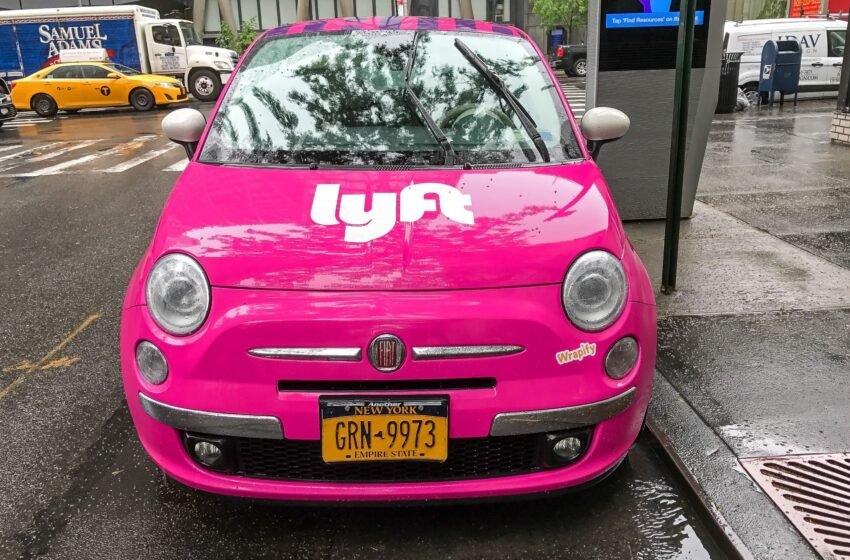Libra Case: Messages Involving President Milei Detected in Forensic Expertise;
Lyft shares continue slide after Q4 earnings: here’s why the stock is down 14%
(Originally posted on : Invezz )
Lyft shares tumbled close to 14% in premarket trading on Wednesday after the company issued weaker-than-expected guidance for first-quarter gross bookings, raising concerns about its ability to compete with larger rival Uber Technologies.
The sentiment is also hampered as several analysts have reduced their target price on the stock.
The ride-hailing platform has been pursuing aggressive strategies to attract riders, including competitive pricing and new features.
However, its efforts were impacted by external factors such as wildfires and extreme weather in key markets.
For the first quarter, Lyft forecast gross bookings in the range of $4.05 billion to $4.20 billion, falling short of Wall Street’s expectation of $4.26 billion.
This mirrors a similar underwhelming forecast from Uber last week, signaling broader challenges in the ride-hailing sector.
At least six brokerages reduced their price targets for Lyft following its fourth-quarter results, bringing the median target price to $18, according to LSEG data.
Lyft’s 12-month forward price-to-earnings ratio stands at 13.8, significantly lower than Uber’s 30, highlighting its valuation gap. In 2024, Lyft shares declined 13.94%, but the stock has rebounded 11.55% so far this year.
Lyft’s Q4 earnings disappoint
Lyft reported a record-high revenue of $1.55 billion for the December quarter, reflecting a 26.6% increase year-over-year, in line with analysts’ expectations of $1.56 billion, according to LSEG.
The company also achieved its first full year of positive free cash flow and profit in 2024. Adjusted profit for the fourth quarter was 29 cents per share, exceeding estimates of 22 cents.
Total revenue rose 27% year-over-year, while gross bookings reached $4.3 billion, representing a 15% year-over-year increase.
Active riders totaled 24.7 million in the fourth quarter, up 10% compared to the previous year, with total rides surpassing 219 million, a 15% year-over-year growth.
Additionally, Lyft’s board authorized a share repurchase program of up to $500 million of the company’s common stock.
Wall Street analysts on Lyft
On Wednesday, Goldman Sachs analyst Eric Sheridan maintained a “neutral” rating on Lyft with a price target of $20.00.
The analysts noted that gross bookings for the fourth quarter were at the lower end of the company’s guidance range.
Additionally, the high-end guidance for Q1 2025 gross bookings fell below market expectations, attributed to challenges arising from reduced prices in the US market.
JPMorgan lowered the price target from $19 to $16 while maintaining a “neutral” rating.
The firm’s analysts acknowledged Lyft’s improved execution over the past year, with notable strides in product innovation and service enhancements for both drivers and riders.
However, JPMorgan raised concerns about growing competition in the rideshare industry, particularly during the latter part of the fourth quarter and into the first quarter.
While Lyft continues to demonstrate a robust gross profit margin of 33.9% and maintains a stronger cash position than debt on its balance sheet, the competitive pressures are weighing on the company’s market performance, as per the brokerage firm.
Barclays and Evercore ISI also cut target prices for the stock.
Barclays analyst Ross Sandler downgraded the price target on Lyft to $19 from $20, while Evercore ISI reduced its price target to $15 from the previous $19.
Lyft’s autonomous driving initiatives
Lyft has announced plans to launch a fleet of robotaxis equipped with Intel’s Mobileye self-driving technology in Dallas as early as 2026.
The company aims to expand the fleet to “thousands” of vehicles in additional markets in the months following the initial launch.
To emphasize its commitment to this initiative, Lyft has partnered with Marubeni, a Japanese conglomerate, to manage fleet operations.
Marubeni will own and finance the Mobileye-equipped vehicles that will be available through Lyft’s ride-hailing app.
While Lyft has not revealed the carmaker it is partnering with for the robotaxi launch, Mobileye’s advanced driver-assistance technology is already featured in vehicles from automakers such as Audi, Volkswagen, Nissan, Ford, General Motors, and others.
The post Lyft shares continue slide after Q4 earnings: here’s why the stock is down 14% appeared first on Invezz







 Bitcoin
Bitcoin  Ethereum
Ethereum  Tether
Tether  XRP
XRP  USDC
USDC  Solana
Solana  TRON
TRON  Figure Heloc
Figure Heloc  Lido Staked Ether
Lido Staked Ether  Dogecoin
Dogecoin  WhiteBIT Coin
WhiteBIT Coin  Cardano
Cardano  USDS
USDS  Bitcoin Cash
Bitcoin Cash  LEO Token
LEO Token  Wrapped stETH
Wrapped stETH  Hyperliquid
Hyperliquid  Canton
Canton  Wrapped Bitcoin
Wrapped Bitcoin  Monero
Monero  Binance Bridged USDT (BNB Smart Chain)
Binance Bridged USDT (BNB Smart Chain)  Chainlink
Chainlink  Ethena USDe
Ethena USDe  Stellar
Stellar  USD1
USD1  Wrapped eETH
Wrapped eETH  Rain
Rain  Hedera
Hedera  sUSDS
sUSDS  PayPal USD
PayPal USD  Litecoin
Litecoin  Dai
Dai  Coinbase Wrapped BTC
Coinbase Wrapped BTC  Avalanche
Avalanche  Zcash
Zcash  Sui
Sui  WETH
WETH  Shiba Inu
Shiba Inu  Toncoin
Toncoin  Cronos
Cronos  USDT0
USDT0  World Liberty Financial
World Liberty Financial  Tether Gold
Tether Gold  Polkadot
Polkadot  MemeCore
MemeCore  PAX Gold
PAX Gold  Uniswap
Uniswap  Mantle
Mantle  Ethena Staked USDe
Ethena Staked USDe  BlackRock USD Institutional Digital Liquidity Fund
BlackRock USD Institutional Digital Liquidity Fund  Circle USYC
Circle USYC  Global Dollar
Global Dollar  Falcon USD
Falcon USD  Aave
Aave  Bittensor
Bittensor  Aster
Aster  OKB
OKB  Pi Network
Pi Network  Sky
Sky  Pepe
Pepe  syrupUSDC
syrupUSDC  Bitget Token
Bitget Token  Ripple USD
Ripple USD  HTX DAO
HTX DAO  NEAR Protocol
NEAR Protocol  Ethereum Classic
Ethereum Classic  Internet Computer
Internet Computer  BFUSD
BFUSD  Ondo
Ondo  Superstate Short Duration U.S. Government Securities Fund (USTB)
Superstate Short Duration U.S. Government Securities Fund (USTB)  POL (ex-MATIC)
POL (ex-MATIC)  Gate
Gate  Worldcoin
Worldcoin  KuCoin
KuCoin  Pump.fun
Pump.fun  Jupiter Perpetuals Liquidity Provider Token
Jupiter Perpetuals Liquidity Provider Token  Midnight
Midnight  Cosmos Hub
Cosmos Hub  NEXO
NEXO  Jito Staked SOL
Jito Staked SOL  Ethena
Ethena  USDtb
USDtb  Spiko EU T-Bills Money Market Fund
Spiko EU T-Bills Money Market Fund  Binance-Peg WETH
Binance-Peg WETH  Rocket Pool ETH
Rocket Pool ETH  Official Trump
Official Trump  Algorand
Algorand  Binance Bridged USDC (BNB Smart Chain)
Binance Bridged USDC (BNB Smart Chain)  OUSG
OUSG  USDD
USDD  Wrapped BNB
Wrapped BNB  Filecoin
Filecoin  Function FBTC
Function FBTC